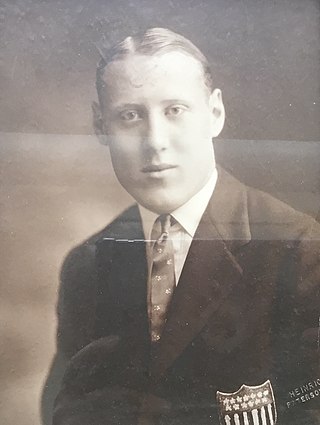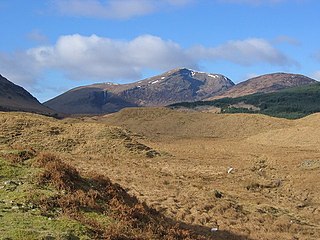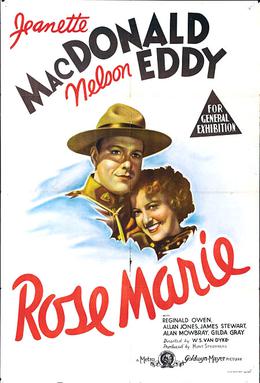Related Research Articles

Clan Campbell is a Highland Scottish clan, historically one of the largest and most powerful of the Highland clans. The Clan Campbell lands are in Argyll and within their lands lies Ben Cruachan. The chief of the clan became Earl of Argyll and later Duke of Argyll.

J. Oliver Macdonald was an American athlete, winner of gold medal in 4 × 400 m relay at the 1924 Summer Olympics.

Clan Donald, also known as Clan MacDonald, is a Highland Scottish clan and one of the largest Scottish clans. The Lord Lyon King of Arms, the Scottish official with responsibility for regulating heraldry in that country, issuing new grants of coats of arms, and serving as the judge of the Court of the Lord Lyon, recognises under Scottish law the High Chief of Clan Donald. Historically the chiefs of the Clan Donald held the title of Lord of the Isles until 1493 and two of those chiefs also held the title of Earl of Ross until 1476.

Bruce Travis McGill is an American actor. He worked with director Michael Mann in the films The Insider (1999), Ali (2001), and Collateral (2004). McGill's other notable film roles include Daniel Simpson "D-Day" Day in John Landis's Animal House, Sheriff Dean Farley in My Cousin Vinny, Matuzak in Timecop, Reverend Larson in Shallow Hal, Gene Revell in The Sum of All Fears, Edwin Stanton in Steven Spielberg’s Lincoln, and Lt. Brooks in Ride Along and its sequel Ride Along 2.

Clan MacDougall is a Highland Scottish clan, historically based in and around Argyll. The Lord Lyon King of Arms, the Scottish official with responsibility for regulating heraldry in Scotland, issuing new grants of coats of arms, and serving as the judge of the Court of the Lord Lyon, recognizes under Scottish law the Chief of Clan MacDougall. The MacDougall chiefs share a common ancestry with the chiefs of Clan Donald in descent from Somerled of the 12th century. In the 13th century the Clan MacDougall whose chiefs were the original Lords of Argyll and later Lords of Lorne was the most powerful clan in the Western Highlands. During the Wars of Scottish Independence the MacDougalls sided with the Clan Comyn whose chiefs rivaled Robert the Bruce for the Scottish Crown and this resulted in clan battles between the MacDougalls and Bruce. This marked the MacDougall's fall from power and led to the rise of their relatives, the Clan Donald, who had supported Bruce and also the rise to power of the Clan Campbell who were the habitual enemies of the MacDougalls and Clan Donald.

The Battle of the Pass of Brander in Scotland forms a small part of the wider struggle known as the Wars of Scottish Independence, and a large part of the civil war between the Bruce and Balliol factions, a parallel and overlapping conflict. It was a victory for King Robert the Bruce over the MacDougalls of Argyll, kinsmen of John Comyn, also known as the Red Comyn, who had been killed by Bruce and his adherents at Dumfries in 1306. The sources do not allow us to determine the date of the battle with any degree of precision: various dates between 1308 and 1309 have been suggested, though the late summer of 1308 would seem to be the most likely. Traquair dates it to August 1308.

The Battle of Dalrigh, also known as the Battle of Dail Righ, Battle of Dalry or Battle of Strathfillan, was fought in 1306 between the army of King Robert the Bruce against Clan MacDougall of Argyll, who were allies of Clan Comyn and the English. It took place at the hamlet of Dalrigh near Tyndrum in Perthshire, Scotland. Bruce's army, reeling westwards after defeat by the English on 19 June at the Battle of Methven, was intercepted and all but destroyed, with Bruce himself narrowly escaping capture. The battle took place sometime between July and early August, but the exact date is unknown.

Clan MacDonald of Keppoch, also known as Clan MacDonellof Keppoch or Clan Ranald of Lochaber, is a Highland Scottish clan and a branch of Clan Donald. The progenitor of the clan is Alistair Carrach MacDonald, 4th great-grandson of the warrior Somerled. The clan chief is traditionally designated as the "Son of Ranald's son".

The MacDonalds of Glencoe, also known as Clann Iain Abrach, was a Highland Scottish clan and a branch of the larger Clan Donald. Named after Glen Coe, the MacDonalds lived there from the early 14th century, until the glen was largely abandoned during the Highland Clearances of the late 18th century.

Aonghus Óg Mac Domhnaill, or Angus Og MacDonald, was a fourteenth-century Scottish magnate and chief of Clann Domhnaill. He was a younger son of Aonghus Mór mac Domhnaill, Lord of Islay. After the latter's apparent death, the chiefship of the kindred was assumed by Aonghus Óg's elder brother, Alasdair Óg Mac Domhnaill.
Fiona MacDonald MBE is a Scottish curler and Olympic champion, born in Paisley. She received a gold medal at the 2002 Winter Olympics in Salt Lake City.

Rose Marie is a 1936 American musical film starring Jeanette MacDonald, Nelson Eddy, and Reginald Owen that was directed by W. S. Van Dyke. It was the second of three movie adaptations from Metro-Goldwyn-Mayer of the 1924 Broadway musical of the same name. A silent version was released in 1928 and a color film in 1954. All three versions are set in the Canadian wilderness. Portions of Rudolf Friml and Herbert Stothart's original score for the Broadway musical are utilized in both the 1936 and 1954 films.
David Bruce MacDonald is a professor in Political Science at the University of Guelph, Ontario, Canada and served as the Research Leadership Chair for the College of Social and Applied Human Sciences. From 2002 to 2008, he worked as a senior lecturer at the Political Studies Department, University of Otago, Dunedin, New Zealand. From 1999 to 2002 he was Assistant Visiting Professor in the Social Sciences at the ECSP Europe (Paris).
Iain Somerled Macdonald-Smith, is a British sailor and Olympic champion. He competed at the 1968 Summer Olympics in Mexico City and won a gold medal in the Flying Dutchman class, together with Rodney Pattisson.

Clan Mackie is a Lowland Scottish clan. The clan does not have a chief recognised by the Lord Lyon King of Arms therefore the clan has no standing under Scots Law. Clan Mackie is considered an armigerous clan, meaning that it is considered to have had at one time a recognised chief, or a chief who possessed the chiefly arms of the name; however, no one at present is in possession of such arms.
Malcolm Maclean or Maolcaluim mac Giliosa in Scottish Gaelic, was the 3rd Chief of Clan Maclean. Malcolm's name has been written Maol-Calum and Gille-Calum, which means Servant of Columba. He became the Chief of Clan Maclean on the death of his father in 1300. He was succeeded by John Dubh Maclean, 4th Clan Chief, his youngest son. Though the eldest son inherited in many clans by then (including Robert Bruce, the eldest of four sons of Robert Bruce VI. who became King of Scots, and Alexander Og Macdonald, his father's eldest son who became Lord of the Isles on the death of Angus Mor Macdonald, it was a time of transition concerning the law of primogeniture. He died around 1320.
Bruce J. McDonald was a Michigan politician. He was a Masons and the Knights Templar member.
Bruce MacDonald may refer to:
Duncan E. MacDonald is an American long-distance runner. He ran collegiately for Stanford University and competed in the men's 5000 metres at the 1976 Summer Olympics. He was also a three-time winner of the Honolulu Marathon, in 1973, 1974 and 1980. In 2017, MacDonald was the boys and girls cross country coach at the Punahou School in Honolulu.
Bruce Duncan MacDonald was an American racewalker. He competed at the 1956, 1960 and the 1964 Summer Olympics. He competed in his first Olympics at the age of 29. He worked four additional Olympics, two in the capacity of team manager and two more as an official.
References
- ↑ "Bruce MacDonald". Olympedia. Retrieved 21 June 2020.